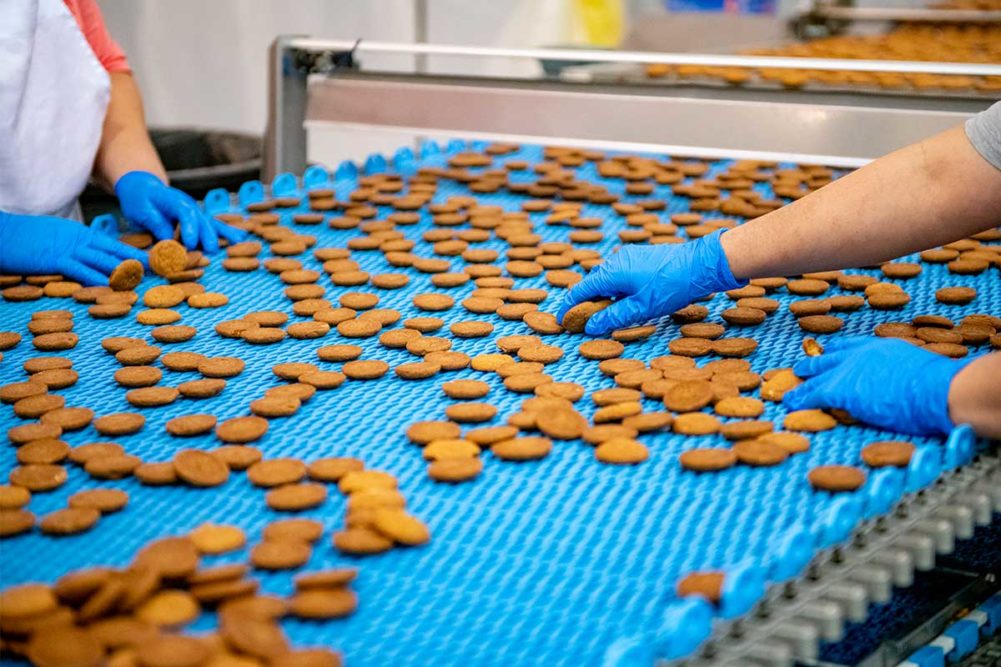As Dewey’s Bakery expands its distribution, it has been adding equipment to automate more of its processes. The Kimwell plant has two continuous production lines — K1 and K2 — both with Polin Hybrid three-zone tunnel oven systems. The 1.2-meter-wide system on K2 was installed in March and makes shortbread cookies among other items.
“We’re in a really high-growth mode, so you need the automation just to keep up,” explained Mike Senackerib, the company’s chief executive officer.
The K1 line primarily produces Moravian cookies. The Jonestown plant also makes them, including a mini version packed into stand-up pouches, which are increasingly popular for retail and convenience stores.
“They come from the historical Moravian baking tradition where they used to roll out super-thin dough but highly seasoned and spiced in flavor,” Mr. Senackerib said. “That is really the heart of what we continue to do in our main cookie that we sell nationally. The way we make those cookies obviously on a much larger scale is now a more automated way of doing that same thing: super thin, highly flavored cookies, such as our Meyer lemon and spiced ginger. We find that as consumers eat them, they do have that surprising intense flavor hit for a little cookie.”
Feeding both lines are four mixers, two 900-lb machines from the Italian Mixer SRL company, and two Triumph mixers, one with a 600-lb capacity and the other 1,200 lbs. All of the bowls except the largest can be rolled to the hoppers, which have an automatic lift system. Ingredients are added manually.
The hoppers, part of the Polin systems, are automated dough loading systems. On the K2 line, a 12-hour shift will yield about 16 batches of dough, which is pulled from the hopper and forms a wide sheet as it travels to a wirecut system that cuts the half-inch-thick dough into chunks.
The belt carries 24 dough balls across then travels into the three-chamber oven, producing 106,000 small cookies an hour. The day of Baking & Snack’s visit, the bakery was making ginger snaps for a co-packing partner. Out of the oven, cookies go through the TP Food North America Tecnopool Spiral cooler, into a vibratory Meyer Bucket Elevator System, then through the Heat and Control Fastback system and an Ishida Scale System. On this day, cookies dropped into a Control GMC tub filling machine. They traveled through a Ceia metal detector and were manually packed into boxes assembled by the Lantech automated box formers.
The dough on the K1 line that makes thin Moravian cookies has a BTE multi-stage dough sheeting system before the cookies travel to a die.
“A die cuts them out, and we have a web-based extraction point where cookies pass through one area in the web, and the webbing is reintroduced instantly into the dough, so our waste is extremely low,” explained David Catlett, chief operations officer.
After being baked in the Polin three-chamber tunnel oven, the Moravian cookies cool quickly and go into a new Benchmark laning system that shingles them, turning them from horizontal to vertical to be packed into sleeves of 34 cookies in the horizontal Campbell on edge biscuit wrapper. They then go through a PPI Technologies checkweigher and are hand packed into boxes. The line can produce 95 sleeves of cookies per minute.
The laning system reduced that packaging task that used to require six to eight workers down to two.
“The product comes out in the little individual 4- to 4.5-oz sleeves, and it’s got the flexibility to do variable sizes,” Mr. Catlett said. “We’re still manual post that, and a big focus of automation going forward into next year is to try to automate that on the back end.”
Mr. Senackerib said when he gets the chance to step back and take stock in what the business has accomplished in the last few years, he’s pleased with what he sees.
“It’s an exciting time in the company’s life because we’re growing so rapidly,” he said. “We’ve grown substantially in the last couple of years. We’ll continue to do that. The investment in capacity and automation and infrastructure is a level of confidence in the growth.”
He would like to see Dewey’s Bakery become one of the leading premium cookie companies in the country in the next few years. If the company continues to see the kind of growth it’s experienced in the last couple of years, the team may be well on its way.
“I’d like to walk into customers and have them say, ‘OK, the Dewey’s guy is here,” Mr. Senackerib said. “I’ve been waiting for them. I’ve got some ideas for you.’”
This article is an excerpt from the June 2023 issue of Baking & Snack. To read the entire feature on Dewey's Bakery Inc., click here.






